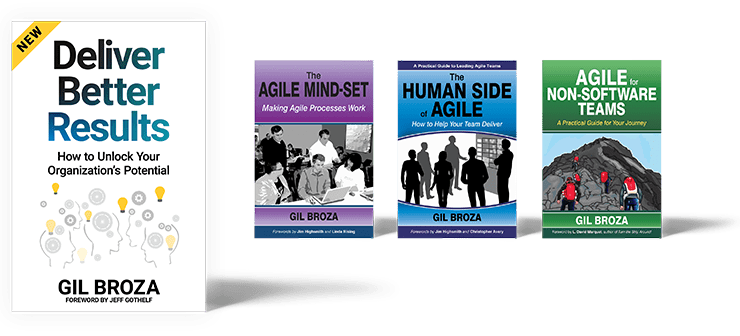Download the book’s supplementary resources
This page includes links to all the supplementary resources mentioned in the book, as well as any additions since the book came out. Feel free to download each and every one. Just right-click and choose “Save As…”.
Chapter 1, The Big Picture
Intentional Mind-Set Poster (not mentioned in the book!) — A colourful, detailed visual of how mind-set bridges “why” and “how”, along with Gil’s process for being intentional about mind-set when working.
The Agile Principles — This quick reference presents the 26 Agile principles, explaining each one in a single sentence.
Chapter 2, Deciding What to Work on
Gil Broza’s Process for Effective Feedback Requests — Operating with the Agile mind-set, you constantly seek feedback. Use Gil’s simple process to receive useful feedback from people (and strengthen your relationships with them along the way).
Chapter 3, Planning the Work
Planning with the Agile Mind-Set — Everything you need for Agile-minded planning, all on one page. Bring it to your next planning meeting!
Chapter 5, Performing as a Team
Collaboration Etiquette (for the A4 format click here) – Increase team member collaboration with these friendly, comics-style posters of the do’s and don’ts of working together. (Note: The book refers to this resource as “Pairing Do’s and Don’t’s”, but in the years since writing it, Gil has found better traction by using the word “collaboration” instead of “pairing”.)
Chapter 7, Doing the Work, Part II: When It’s Software Development
Technical Agility Self-Assessment — Take 10 minutes to work through this questionnaire and see how your team’s technical execution supports overall value delivery (and your readiness for continuous delivery). Discover options for increasing your technical Agility, and enrich your retrospectives with rarely discussed insights and data.
Chapter 8, Getting Better at Work
Ideas for Retrospective Topics — Not every retrospective must follow a rote “Worked Well / Needs Improvement” format. Every now and then, get your team to examine their process and teamwork with these conversation-starting questions.
Chapter 9, Adopting the Mind-Set
Mindset-Driven Custom Agile Implementation: Case Study (not mentioned in the book!) — How a 35-person project team at one of Canada’s banks designed a custom Agile implementation by first determining values, articulating beliefs, and choosing principles.
Considerations for Choosing Your Agile Coach — Great coaches minimize the headache and risk involved in an Agile transformation. However, they are not buzzword-compliant resources, and choosing the right coach for you can be tricky. Use this checklist to assess your candidates.
How Agile Are You? — Assess your “state of Agile” with this worksheet, which recasts the Agile principles as questions for self-assessment (these are the questions from the “How Agile Are You?” section in chapter 9, so you don’t have to copy from the book :-))


